Breaking
the FRAME: Pioneering Women in Photojournalism
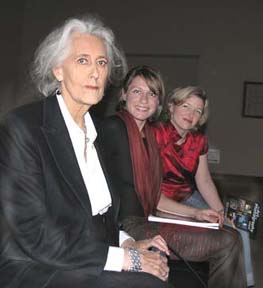
Museum of Photographic Arts / San Diego is mounting a museum-wide
examination of the photographs, films, newsreels, and cameras
from the late 1920s to mid-1950s that changed the world. Breaking
the Frame celebrates the first women in photojournalism such
as Margaret Bourke-White, Grace Robertson, Therese Bonney, Hansel
Mieth, Esther Bubley, and Olga Lander. A film series will complement
this and the two adjacent exhibitions, Today's Pioneers:
Women Photojournalists in Iraq and Afghanistan - Andrea
Bruce and Stephanie Sinclair. To September 17th. And Shooting
in 35: The First 35mm Photographs.
May 7 - Sept. 24, 2006
www.mopa.org
Phone: 619.238.7559
pictured, l. to r. Grace Robertson, Andrea Bruce, Stephanie
Sinclair
reception photographs and article by: j. Madison Rink ©
2006
Fly, drive, bus, bike, walk or take the rail - however challenging
I truly recommend that you do your best and get to the Museum
of Photographic Arts MOPA, San Diego and see the inspiring work
of eight pioneering women in photojournalism. Fortunately Jean
Ferro, WIPI president called to see if I could take her place
at the Opening reception on Friday, May 12. Jean was in the
final stage of the 25th Anniversary - WIPI "Turning
Silver" competition and just couldn't break away. It
was an amazing opportunity handed to me and quite a stretch
for this monk-like, underground fine art photographer. This
would be my first shot, pardon the pun, at photo journalism
and promised myself not to cower... so I said yes. Jean empathized
with my concerns, supported and encouraged me and truly lived
up to the WIPI mission statement and philosophy of "promoting
women working in the photographic arts," and that's what
this organization is all about! I'm so grateful.
The three distinguished photojournalist present and honored
at the opening, were Grace Robertson, (WIPI Distinguished
Photographer Awardee 1992), Stephanie
Sinclair (WIPI PRO Member and founder of PhotoBetty.com)
and Andrea Bruce. I charged around all night, popping a
blinding flash like a bull in a China closet. Jean's motto.."just
do it".. So my subjects endured my photojournalist debut.
|
|
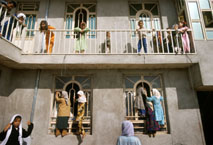
© Stephanie
Sinclair |
Simply standing in the presence of these extraordinary exhibits
stirred a strong sense of pride and inspiration in me; a heartwarming
privilege. Each photojournalist bearing their own rich history
of experience, achievement and survival while facing varying
adversities in pursuit of their chosen fields. Clearly, all
eight women being honored in this exhibit expressed a unique
and artistic point of view and shared ONE characteristic in
common; all bold and daring risk takers who broke with tradition,
found ways to circumvent the system, strike out on their own
and risk capturing images reflecting a quiet, sometimes blissfully
light, more often a chaotic and painful intimacy with the issues
and people of the times. All, showing the world stories through
the lens of their vision.
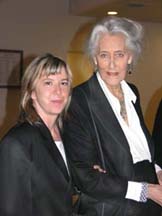
The lecture series for the evening began with a packed audience
and warm introductions by Carol
McCusker, the museum's talented and highly motivated
curator who seemed no exception in this league of women, herself.
I was truly inspired by her courage as I now recall her bold
assertion, that if more women were introduced into leading positions
around the world, we might actually end up with a more useful
balance of testosterone, and certainly unlike the level operating
right now... How brave to say that!
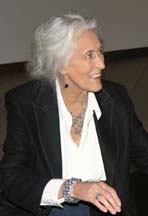 Oh, the stature, elegance and delightful eccentricity of the
renowned photojournalist Grace Robertson, from the United
Kingdom. She was first to grace the lecture stage dawning images
projected behind her on a large film screen, depicting an earlier
time -- the aftermath of World War II and amidst the great Depression,
she often turned her eye to such images as the heartwarming
delights of everyday life. The sweet joy and surprise
of children at play and those familiar, highly regarded images
from her well known documentation, the "London's women
pub outing" which she photographed first for Picture Post
and then for Time Magazine. I was later moved during the audience
question- answer period when she firmly asserted, 'No, I didn't
shoot the war. I lived it! I was stunned by it! A terrible thing,
for a tender young child to stand amidst the rubble, so concerned
about the chaos and the confusing, unclear randomness of it.'
Oh, the stature, elegance and delightful eccentricity of the
renowned photojournalist Grace Robertson, from the United
Kingdom. She was first to grace the lecture stage dawning images
projected behind her on a large film screen, depicting an earlier
time -- the aftermath of World War II and amidst the great Depression,
she often turned her eye to such images as the heartwarming
delights of everyday life. The sweet joy and surprise
of children at play and those familiar, highly regarded images
from her well known documentation, the "London's women
pub outing" which she photographed first for Picture Post
and then for Time Magazine. I was later moved during the audience
question- answer period when she firmly asserted, 'No, I didn't
shoot the war. I lived it! I was stunned by it! A terrible thing,
for a tender young child to stand amidst the rubble, so concerned
about the chaos and the confusing, unclear randomness of it.'
It's now a week later and I continue to be haunted by the work
of Andrea Bruce and Stephanie Sinclair. The numbingly
stunning, poetically rich, conflictingly beautiful and profoundly
painful images depicting the chaos and tragedy of the war in
Iraq and Afghanistan shot by these two gutsy award winning photojournalists.
I bumbled all over them the entire evening, awe struck by the
warm and lovely hearts they both still wore on their sleeves;
badges of great strength and courage. This is a tremendously
important body of work which they struck out to accomplish on
their own. Instead of choosing to be embedded with the troops
they independently headed straight for the underbelly of this
ongoing raging war for active combat shots and a the sacred
opportunity to enter the dark intriguing wombs, the domestic
life of the women and children in this rich culture a unique
place - where their male counterparts are not allowed to go.
Both Andrea and Stephanie spoke softly, describing the starkly
looming images on the huge screen appearing traumatized at times
all over again, by their own poignant shots. One can easily
see, their own suffering still lingers but they returned with
a palatable love and deep compassion for the people and the
countries they photographed.
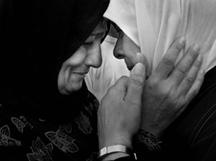
© Andrea Bruce |
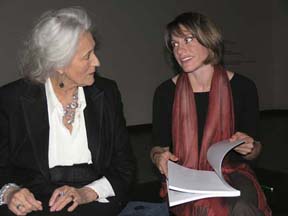 |
Stephanie Sinclair wanted us know that she had learned the vital
importance of listening, to everyone's point of view, even when
we don't agree. Andrea Bruce spoke of how often she would break
down and cry while in the midst of doing her work. "Perhaps
it's a woman thing," she lamented. Separate from the exhibit,
I read from her online journal, of flesh sticking to her shoes
as she persevered through shooting scenes flooded with body
parts. Stephanie later jumped in to say, "I cried too and
I'm not so convinced it's a woman thing. I saw plenty of men
over there break down and cry. I wanted to bring this work back.
I just want people here, to care."
A woman rustled in the chair behind me and frantically whispered
to the person next to her, "What does she mean? She doesn't
think we care?" It sounded like a kind a conundrum to me
because I understood them both -- as confusing as it might be
-- whatever does it mean to show that we care?" Traveling
to see this powerful exhibit was important for me. I can't stop
thinking about it. I do hope this brings some relief and joy
to the hearts of these brave and dedicated photojournalists
who risked their own lives and emotional stability to bring
this message and their extraordinary photojournalistic images
back. Let us all find our own way -- show ourselves and the
world that we do truly care as photographers that continually
document the world around us.
Special thanks to j. Madison Rink, e-mail: info@RinkArte.com
WIPI CHARTER Member for documenting and photographing the reception
of Pioneering Women
  j.
MADISON RINK, los angeles, ca (2006) j.
MADISON RINK, los angeles, ca (2006)
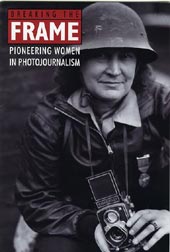 Breaking
the FRAME: Pioneering Women in Photojournalism Breaking
the FRAME: Pioneering Women in Photojournalism
May 7 - Sept. 24, 2006
Today's
Pioineers: Women Photojournalists in Iraq and Afghanistan, Andrea
Bruce and Stephanie Sinclair
May 14 - Sept. 17, 2006
Award-winning photojournalists Andrea Bruce and Stephanie Sinclair
bring the legacy of the women in Breaking the Frame full curcle.
Each opted not to be imbedded while working in Iraq and Afghanistan,
entering instead into the fray of daily life and domestic communities
that are off-limits to male photographers and capturing unique
images of Muslin life.
Museum of Photographic Arts / San Diego
www.mopa.org
Phone: 619.238.7559
NOTE: May 29, 2006 Two
British journalists, CBS cameraman Paul Douglas, 48, and
soundman James Brolan, 42, died at the scene in a car bomb
attack on a US military convoy in Baghdad as they were working
on a story about American troops in Iraq on Memorial Day.
Reporter Kimberly Dozier, 39, is still critical in a German
hospital. An American soldier and an Iraqi interpreter were
also killed in the same blast and six American soldiers
were injured.
"Kimberly, Paul and James were veterans of war coverage
who proved their bravery and dedication every single day,"
CBS News President Sean McManus said in a statement. "They
always volunteered for dangerous assignments and were invaluable
in our attempt to report the news to the American public.
According to Abi Wright, spokeswoman for the New York-based
Committee
to Protect Journalists shows that CBS cameraman Paul
Douglas, 48, and soundman James Brolan, 42, killed in Baghdad
by a suicide car bomb on Monday, were the 70th and 71st
journalists to die in Iraq since the U.S. invasion in 2003.
Ann Cooper, CPJ's executive director, said that while
foreign media deaths get a lot of attention, three-fourths
of those killed have been Iraqis, who are encountering the
same dangers whether they work for local media or western
media.
WIPI sends our deepest sympathies to their families. We
wish Kimbery Dozier a speedy recovery.
GOOGLE
NEWS |
|
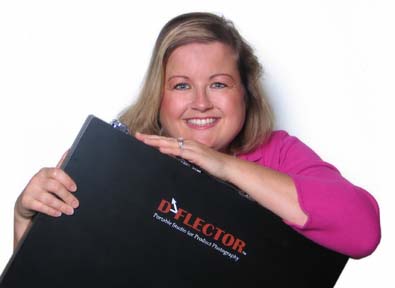
Sharpics,
Inc. Danica Mazon, Co-Founder and Vice President
Danica Mazon was born and raised in Southern California. She
received her Bachelor's Degree in Liberal Arts from Loyola Marymount
University. She was raised in a photographic family. Her father
has been a professional photographer specializing in family
portraits, weddings and school photography her entire life.
As a teenager, she would work in her father's studio helping
customers place order. Her love of customers took her into inside
sales positions after college. Once she got married Jeffrey
and started a family, she wanted a career that could offer her
the ability to play an active role in her children's lives.
As Co-Founder and Vice President of Sharpics, Inc., Danica has
found a way to accomplish both goals for career and family.
Jeffrey Mazon, Founder of Sharpics Inc. has been working in
the consumer electronics industry for over twenty years specializing
in product development and project management. Jeff originally
created photographs with a floating-on-air effect using expensive
equipment in a dedicated studio environment. His colleagues
wanted this effect for their presentations too. But it took
too much time going back and forth from the office to the studio.
After many long months of developing the concept, the D-Flector
was born. Together with his wife Danica, they created a business.
It was Danica's father, a professional photographer that inspired
them to pursue this revolutionary concept in an industry they
know extremely well.
WIPI: The D-Flector is such a unique product, who developed
it and how long did it take from start to finish ?
DANICA: The D-Flector was created by myself, Danica Mazon and
my husband Jeff starting in August of 2003. Jeff had a need
to take product photos for his job. He did research to find
out what the options where for tabletop studios that he could
keep near his desk. After an investigation, he learned that
the options were limited and often expensive. Jeff decided to
create his own solution, and the D-Flector was born. From the
early stages of research and development to bringing the product
to market was one year.
WIPI: Was the Monopod part of the original idea?
DANICA: Our goal was to offer a complete solution for product
photography. We knew that a stable camera platform is a key
component. In the early stages, we were reselling a monopod
that was available in the market place. In time, we identified
design improvements and decided to make our own.
WIPI: How did you test market your product ?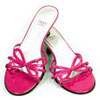
DANICA: In the early stages of our product, we sold it on eBay
in one size. Our customers requested larger sized D-Flectors
to meet their needs. eBay was a great launching pad to connect
with customers. A year later, we made the D-Flector available
in a total of 4 sizes.
WIPI: What do you see in the future for Sharpic's?
DANICA: We would like to be the leader in product photography
solutions. Our customer's have asked for a solution for jewelry
photography. This is our current project.
WIPI: Seems like HOME shopping or QVC would be great for
this product, have they approached you or have you contacted
them?
DANICA: We would like to do business with HSN and QVC.
Our goal is get the word out about the D-Flector.

WIPI: On a personal note, what kind of photography do you like
the most?
DANICA: I like photography involving children in nature. One
of my favorite photos is one of my children taken on the beach
in cuffed jeans and sweaters walking away from the camera along
the shoreline. All the details of the seagulls on the shoreline
are amazing, captured by Creative Images/© David Anderson
WIPI: Lastly, who are your favorite female photographers?
DANICA:I am a big fan of Jennifer Walker, a photographer here
in San Diego. Her work is truly artistic and inspiring.

Tranquility, Cabo San Lucas, August 2003, © Danica
Mazon
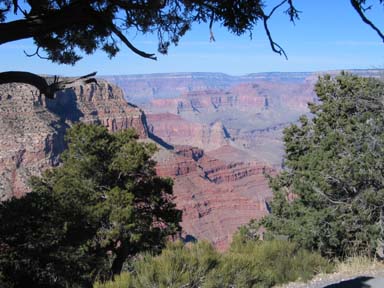
Grand Canyon, November 2005,© Danica Mazon
Sharpics.com
PR contact:
Lynn Pittman
Marketing, Public Relations, Brand Building 619-542-1898
WIPI Member PERK promotion
for your D-Flector purchase
|
|
"LOOK
AND LEAVE : New Orleans in the Wake of Katrina"
Photographs
by Jane Fulton Alt
See
Jane's website directly to see ALL
the katrina
photos
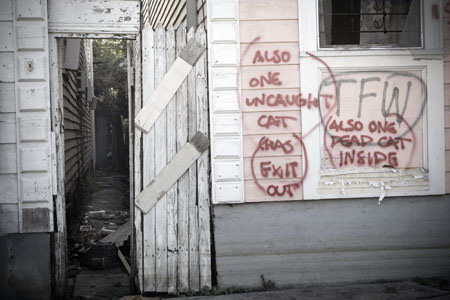
This
project grew out of having witnessed the aftermath of an unprecedented,
devastating, natural disaster. read
and see more
It's
rare that we really focus on programs... Online printing is a
growing trend that is here to stay. First the photo companies
panicked over home printing and now they've found a new ground to
stand on and a very good one at that. It supports the PRO and the
amateur market. I'm not sure what is available in Europe. I'm guessing
pretty much the same in each country. At one time it seemed an amateur
practice to send film off to be developed, now with digital, the
possibilities are endless. Read
about the possibilities and links to photoshop learning centers.
|
|
 Sylvia Plachy - Distinguished Photographer 2004
Sylvia Plachy - Distinguished Photographer 2004